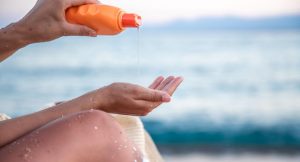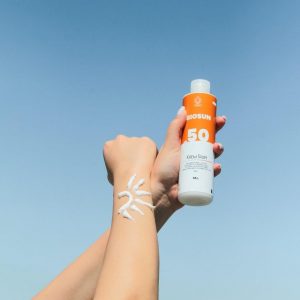BLOGS
Wear Sunblock This Rainy Season
Self-care is a crucial part of our daily routines. After a long day’s work, we must treat our skin with utmost care because it’s the barrier that protects our internal organs from bacteria and others that could be detrimental to our health. Our skin is the largest organ in our body and we should be active in protecting it. We know how intense the heat of the sun can get as we live in a tropical country. We follow the unwritten basics such as using hats, umbrellas, passing by shaded areas, and wearing sunblock. But when the rainy season arrives, should we still
Applying sunblock is a skincare staple. Whether you’re going for a dip in the ocean, a run in the park, or just strolling down the farmer’s market, you should always wear sunblock to protect you from the harmful rays of the sun. But does this still apply during the rainy season? That’s what we’re here to find out.

Investing in a good quality sunblock is a must because of the benefits you can reap in the long run.
Sunscreen vs. Sunblock
Before we delve deep into sun protectants, let’s first discuss some definitions of terms. When you’re in the department store, scouring through the beauty section, you will notice the terms ‘sunscreen’ and ‘sunblock.’ You find yourself confused as to which one to pick up.
Sunscreen is a chemical sunscreen which “screens” some of the sun’s UV rays (Ultraviolet) but lets some in. They usually contain oxybenzone or avobenzone. On the other hand, sunblock is a physical sunscreen and reflects the sun’s rays from the skin and therefore, blocking the rays from entering the skin.
Both sunscreen and sunblock are sun protectants. In terms of choosing which one to purchase, it’s really all just a personal preference but if you have sensitive skin or have any known allergies, it is recommended to wear sunblock but you must still inspect the active ingredients present so you can make an informed decision.
You should take note that the method of application of these two products differs. Sunscreens need to be rubbed into the skin so the product can be absorbed. Sunblocks can simply be slathered onto the skin since it acts as a physical barrier between sun rays and the skin. Although it needs to be applied evenly because UV light hits any exposed part of the skin.
Why we should wear sunblock

As the name states, sunblock “blocks” the harmful rays of the sun to prevent them from penetrating the skin and causing skin problems as critical as skin cancer.
We use sunblock to shield our skin against the following:
● UVB rays
● UVA rays
● Blue light, from electronic devices
UVB rays damage the outermost layers of the skin. This causes sunburn and blistering. Ultraviolet B rays do not penetrate that deep into the skin but they can cause serious burning on your epidermis. These rays have the ability to damage skin cells and cause DNA mutations which can eventually lead to the development of melanoma or skin cancer.
If UVB rays can cause the skin to burn, UVA rays on the other hand can cause signs of aging such as early-onset of wrinkles and loss of elasticity. These rays can penetrate the skin deeply and constant exposure can cause genetic damage to the skin, with extreme cases leading to skin cancer. The skin’s defense mechanism is to darken and over time can result in premature aging. This still applies even if you’re cozy and warm inside your luxury house because UVA rays are infamous for penetrating even through clouds and windows.
Blue light, also known as High Energy Visible light, is emitted by electronic devices such as computers, cellphones, television, to name a few. It’s known to cause digital eye strain and disrupt our body’s circadian rhythm but did you know it also damages the skin? The blue light coming from the screens of our devices can reach far deeper into our skin than UV light can.
Studies also reveal that blue light can be more notorious for causing pigmentation compared to UV light. Experts in the field further claim that blue light confuses skin cells to think it’s still daytime, therefore disrupting the nighttime regenerative cycle of cells.
In an ideal world, a no-brainer solution to prevent harming your skin is to avoid long exposures to sunlight and blue light. Since sun and digital exposure is unavoidable, we should give our skin the best defense possible. Sunblock will serve as a protective layer of your skin against these harmful rays.
Does SPF matter when you wear sunblock?

Before purchasing sunblock, check its ingredients list and SPF rating.
What’s the major selling point when it comes to sunblock? The higher the SPF, the better. But what does SPF mean and why should we look for the highest possible number available? SPF (sun protection factor) pertains to the ability of the sunblock to block UVB rays that cause sunburn.
The SPF rating seen in sunblock bottles is the measure of how long the product can protect you from UVB rays. According to dermatologists, purchasing a sunblock between SPF 15 to 50 is ideal. Wearing sunblocks that have high SPF doesn’t give you a whole lot more protection. An SPF 30 can block 97% of UVB radiation, an SPF 50 blocks 80%. Although, sunblocks available in the market today are offering products with the title ‘broad-spectrum.’ This means the sunblock can protect you from both UVB and UVA rays.
The next time you shop for sunblock, look for SPF 15-30 with broad-spectrum. Another useful tip in wearing sunblock is to apply it evenly and know when to re-apply it. Dermatologists recommend applying sunblock at least 30 minutes before heading out and re-applying every 2 hours.
Can sunblock still serve its purpose during the rainy season?

Don’t skip on the sunblock regardless of the weather you’re experiencing.
You might be thinking that these are fun facts and tips to know but, are we still supposed to wear sunblock during the rainy season? Since the sun might be missing in action during this season, should we still bother applying sunblock? The answer is yes, we wear sunblock regardless of the season we’re having.
As discussed earlier, clouds do not completely block UVB and UVA rays. Clouds can only minimize UV rays up to 25% so even though the sun is invisible, it can still be absorbed by the skin. Even though it’s no longer summer, sun care protection should still be maintained. We should always keep in mind the consequences of not protecting our skin against the harmful rays of the sun.
Sun damage is not just your common sunburn. It also manifests in premature skin aging, wrinkles, cell death, collagen degradation, and in severe cases, skin cancer. Always include sunblock in your skincare routine. Do your skin a favor every day and wear sunblock.
Always Give Yourself The Best
In the end, we should always give ourselves the best we can. After all, skin is the largest organ of the body and we must not neglect it. It helps us protect our internal organs from threat and the least we can do is treat it with care. Always put sunblock in your cosmetic bag so you won’t forget to apply and re-apply it within the day.
Here at Brittany Corporation, we also believe that you deserve the best. May it be pampering yourself or treating yourself to a luxury home, our properties can provide it for you even this rainy season. Crosswinds by Brittany will transport you to beautiful Switzerland where you can feel the famous cool breeze of Tagaytay. Remember, even though the climate is cool, we highly encourage you to wear sunblock!
We at Brittany offer the best luxury houses and experiences for our clients. Experience thriving in a life of opulence, exclusivity, safety, and security in our properties. Learn more about our luxury homes and condos here.
















